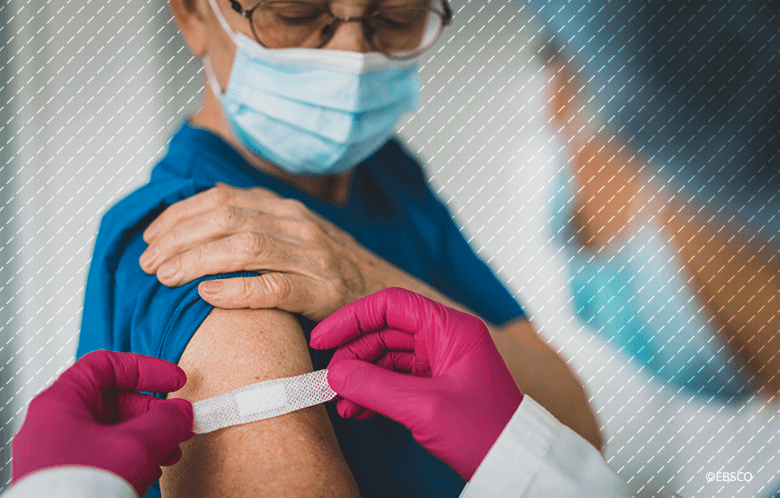A booster shot is a vaccine given after a primary vaccine series that is intended to literally boost the immune response. Booster shots are not new (given for meningococcal and tetanus vaccinations, among others), nor is it surprising that they have become the center of attention at this point in the pandemic. Here are key questions to ask about booster shots.
Is vaccine-induced immunity to COVID-19 waning (i.e., are booster shots really necessary)?
While antibody levels have been shown to diminish over time, what remains an open question is whether reduction in antibodies is associated with breakthrough infections and, importantly, with infections causing severe COVID-19. There are a few pieces of evidence that suggest that vaccine protection against severe COVID-19 persists, despite the reduction in antibody levels.
The first is that the characteristics of people with breakthrough infections have not tracked with the allocation of vaccines in the United States. That is, if waning immunity was a risk for breakthrough infection, we would predict that people who got their vaccines earliest, such as older individuals and healthcare workers, would have been the first populations to get breakthrough infections.
Instead, what has been observed is that breakthrough infections first occurred in areas where the Delta variant was most prevalent and does not appear associated with timing of vaccination. This suggests that Delta may be a stronger correlate for breakthrough infection than waning immunity.
The evidence indicates that booster shots may not be needed for the healthy general public at this point in the pandemic.
At some point, it is likely that booster shots will be necessary, and the rollout should prioritize those at highest risk for severe COVID-19, including older individuals and persons with underlying conditions.
At some point, it is likely that booster shots will be necessary, and the rollout should prioritize those at highest risk for severe COVID-19, including older individuals and persons with underlying conditions.
Who might benefit from a booster shot?
Certain populations may not make a robust immune response to the primary vaccine series and, therefore, may not retain immunological memory capable of protecting against severe COVID-19. Notably, these include persons with immunocompromise and older individuals. These populations are more likely to benefit from booster shots sooner than healthy adults.
The CDC currently recommends an mRNA booster shot for those with moderate to severe immunocompromise who received a primary mRNA vaccine series. This includes patients receiving cancer treatment, those taking immunosuppressive medications, patients with a primary immunodeficiency disorder, and persons with advanced or untreated HIV. At this time, an additional vaccine dose is not recommended for older individuals nor for the general public.
Similar guidance has been issued from Canada’s National Advisory Committee on Immunization (NACI) and the European CDC. Europe has notably included an additional consideration for booster shots in older individuals, particularly those living in long term care facilities. Other countries and regions are also debating booster shots for vulnerable persons and entire populations.
At some point, it is likely that booster shots will be necessary, and the rollout should prioritize those at highest risk for severe COVID-19, including older individuals and persons with underlying conditions.
Are booster shots associated with more or different adverse events than the primary vaccine series?
Rare adverse events such as pericarditis and myocarditis have been observed after primary mRNA vaccination. These cardiac complications were more prevalent after the second shot, leading to questions about the safety of a third booster dose. There is currently limited information about the adverse events after a booster shot, but they appear to be similar to those reported after the primary vaccine series.
A study out of Israel, where booster shots are available to fully vaccinated people over 60 years old, inexplicably failed to report any safety outcomes. No safety concerns have been noted in the media coverage of the Israeli data.
Interestingly, Moderna is testing a reduced dose booster shot, which may quell some of the adverse effects observed with their vaccine. In a press release, they report a similar safety profile after the third dose compared to the second shot.
Will a booster shot protect against Delta or other variants?
Currently, the booster shots contain the same vaccine as the primary series, so they are not modified to target any specific SARS-CoV-2 variant. However, the original vaccine strains are effective at preventing hospitalization and death due to Delta and other common variants.
The newest variant of interest, Mu, has mutations that are expected to evade therapeutic and vaccine- or infection-induced antibodies, but whether these diminish the effectiveness of vaccines has yet to be established.
As we march towards endemicity, it becomes more likely that seasonal COVID vaccines targeting circulating strains will become a viable approach, much like we do for influenza each year. For now, the WHO is stressing that the priority should be to fully vaccinate the global population before administering booster shots.



